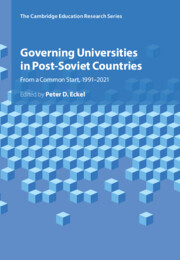We conceived this book as a comparative study to examine the University governance models in fifteen independent countries, which at one point in history belonged to the same system of government, the USSR. We were curious about the University governance models that might have emerged in this unique and special natural laboratory of socioeconomic and political transformations since 1991 when the Soviet Union dissolved. The book repeatedly references the Soviet Union and treats it as an artifact of the past from which to look forward, thus our use of the term “post-Soviet.” We recognized that as we write this, even this is a contestable and politically laden term. However, we have decided to keep it in place because that shared history and the impact of that shared history on universities and University governance throughout the region is salient. We also adopt the term “former Soviet” when the old empire’s legacy is not relevant.
In this book, we set out to understand how the fifteen countries that were once incorporated into the Soviet Union have today structured their University governance efforts. In this project, we realize that universities and each nation’s higher education systems are reflections of their governments. Their political and cultural identities, long-standing but also changing, shape the structure of universities and the role they play or are constrained from playing. To oversimplify, market-based, democratic nations treat their University systems differently from those in centrally planned economies and in autocratic regimes. While universities are part of the global academic world, with its growing neoliberal tendencies, their local contexts matter in what they do, how they are supported, and, importantly to this book, the ways through which they are governed.
The former Soviet space includes what is now a range of very diverse countries, from the Baltic countries, full members of the European Union and NATO, to Russia and the inward-looking Turkmenistan, and to the countries of Central Asia. Their University systems vary, as explored here. In thirty years, these self-governing nations and their universities have developed along a variety of paths, allowed because of their independence and sovereignty.
While the focus of this book is on the time immediately before the Russian invasion of its neighboring country Ukraine on February 24, 2022, one cannot stop wondering how this region, and by extension its higher education space, will look on the other side of the conflict. Predictions are beyond the scope of this book. However, this aggression within the region will have lasting impact on individuals’ lives and institutions regardless of when and how the conflict is resolved.
The richness of this book is its focus on a set of higher education systems and their governance in countries once controlled by a now dissolved nation that demanded control and fidelity with economic, political, and philosophical objectives for its universities. Across the region, much diversity has been created over thirty years of independence and openness to the global world once the Iron Curtain had fallen. The authors reflect much of that regional diversity and and go beyond it to be an international collective. The contributors are Tajik, Latvian, Kazakhstani, as well as Moroccan and American. We have varying experiences in the region as students, staff, consultants, and academics. This examination is an academic effort, but we have personal and professional and familial linkages to this region. So, we pay attention to current events on multiple levels and with a range of emotions, often difficult.
Universities by their mission and construct are future-focused. They prepare the next generation of citizens, turn their research prowess to solving emerging challenges, and shape economies and contexts for the long run. We can only hope for a future of peace, independence, and self-governance and that universities are allowed to do the good work that they can.
We want to thank the following individuals and organizations for their support of this project. First, we acknowledge Dean Aida Saginiayeva of Nazabayev University’s Graduate School of Education (NUGSE). This book grew out of a partnership between NUGSE and the University of Pennsylvania’s Graduate School of Education. Thank you to Isabel (Izzie) Collins of Cambridge University Press for her patience and willingness to extend deadlines, to Becky Taylor also of Cambridge University Press for her support, and to Trent Hancock and Aiswaraya Naraynanan for their production assistance. Thank you to Julie Manokhina formerly of Penn GSE for her editorial assistance (terrific figures and tables) and her thoughts on the manuscript. We also thank the following individuals for their ideas, resources, and helpful suggestions on various parts of this manuscript and our thinking: Denis Nikolaev, Stephen Heyneman, Isak Froumin, Rachel Baker, Sharistan Melkonian, and Ion Gonta. Our final appreciation is to an anonymous reviewer for helpful comments.
Lastly, we close with thoughts and good wishes to the people of Ukraine and to those whose lives have been taken and the many others disrupted and displaced by these disturbing and all too avoidable events.

